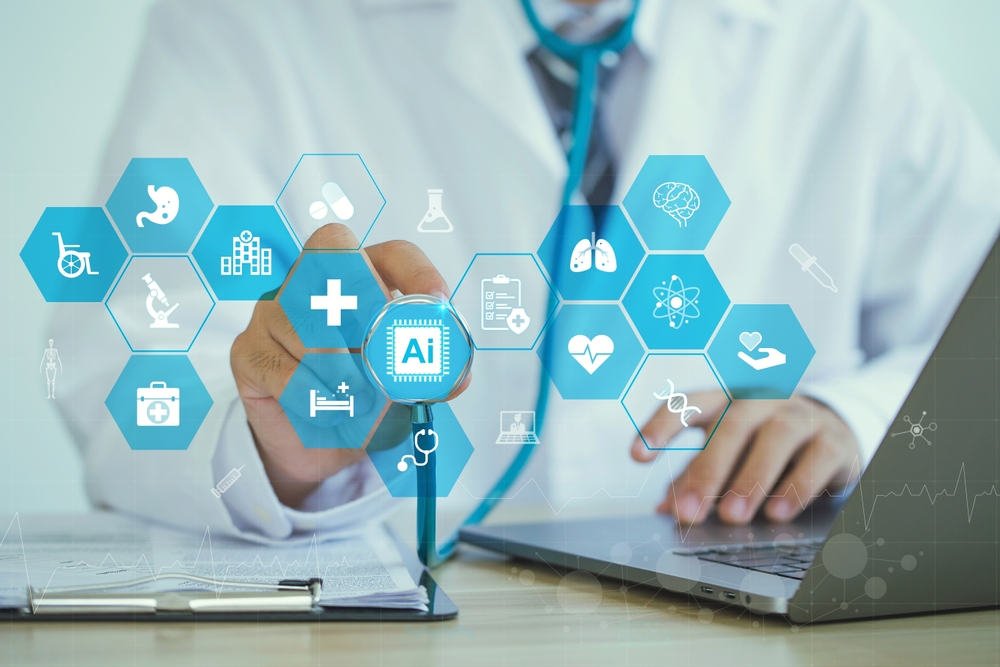Top AI Tools For Healthcare Professionals
Explore the latest advancements in artificial intelligence technology for healthcare professionals, including tools for diagnostics, treatment planning, patient monitoring, and more. Stay ahead of the curve with these cutting-edge AI solutions.
The integration of artificial intelligence (AI) into healthcare represents one of the most promising advancements in the field of medicine. AI in healthcare refers to the use of complex algorithms and software to emulate human cognition in the analysis, interpretation, and comprehension of complicated medical and healthcare data. The primary aim of healthcare AI is to allow for the provision of a more personalized and efficient healthcare service to patients, which could not have been achieved by human providers alone. Through the analysis of this technology, we can explore its benefits, reasons to utilize it, top software solutions, and associated costs, while considering offers such as "Free Trial" and "Free Demo" that make it more accessible to healthcare providers.

What is Healthcare AI?
Healthcare AI encompasses a variety of technologies including machine learning algorithms, natural language processing, and pattern recognition, all of which can be applied to a range of tasks such as diagnosis, treatment recommendations, patient engagement and adherence, and administrative activities. It has the potential to transform healthcare systems by improving outcomes, reducing costs, and enhancing patient care. AI systems can process vast amounts of data quickly and accurately, which allows healthcare professionals to gain insights into patient care, the effectiveness of treatments, and the efficiency of operational processes within a fraction of the time it would take humans.
Benefits of AI in Healthcare
The benefits of AI in healthcare are manifold. AI enables the analysis of large datasets to identify patterns that humans cannot, which can lead to early disease detection, personalized medicine, and more informed decision-making. It can also streamline administrative processes, reducing the time healthcare professionals spend on paperwork and allowing them more time to focus on patient care. AI-powered tools can assist doctors during surgeries, provide virtual assistance to patients, and monitor patient vitals in real-time, enabling immediate intervention when necessary. Additionally, AI contributes to the development of new drugs by accelerating the research process, thereby potentially reducing the time and cost associated with bringing new medications to market.
Reasons to Utilize AI in the Medical Field
The utilization of AI in the medical field is driven by several compelling reasons. Firstly, AI can handle the increasing amount of data generated in healthcare settings, providing actionable insights that can be used to improve patient outcomes. Secondly, it can help address the shortage of healthcare professionals by enabling existing staff to work more efficiently and effectively. Thirdly, AI algorithms can help reduce errors, such as those in medication administration or diagnosis, thus improving patient safety. Additionally, AI can improve access to care by providing remote diagnosis and monitoring services, especially in underserved or rural areas where medical expertise is limited.
Top Healthcare AI Software
Several top healthcare AI software solutions are making significant strides in the industry. IBM Watson Health, for example, uses cognitive computing to analyze structured and unstructured data in healthcare records. Google's DeepMind Health is working on AI research projects with healthcare providers to solve real-world health problems. Other notable AI healthcare software includes Nuance’s Dragon Medical One, which uses AI-powered speech recognition to help clinicians document patient care, and Tempus, which utilizes AI to personalize cancer care by analyzing clinical and molecular data.
Costs
The costs associated with implementing AI in healthcare can be substantial. These costs include the acquisition of the software itself, integration into existing systems, training of staff, and ongoing maintenance and updates. However, the long-term savings and efficiency gains can offset the initial investment. It is also worth noting that AI has the potential to reduce overall healthcare costs by aiding in the prevention of diseases, optimizing treatment plans, and reducing unnecessary procedures.
Offers
To mitigate the financial risk and encourage adoption, many AI healthcare software providers offer "Free Trial" or "Free Demo" options. These offers allow healthcare providers to experience the software firsthand without committing financially. A "Free Trial" typically allows users to use the software for a limited time, while a "Free Demo" might provide a guided tour of features and capabilities without the ability to input real data. These offers are invaluable for decision-makers in healthcare to assess the compatibility and benefits of AI solutions before fully investing in them.
AI in healthcare is a rapidly evolving field with the potential to profoundly impact every aspect of patient care and healthcare management. As we have seen, the benefits of AI in healthcare range from improved patient outcomes and efficiency to cost savings and enhanced accessibility of care. The reasons for its utilization are clear and the top healthcare AI software solutions continue to push the boundaries of what is possible in medicine. While the costs of implementation can be significant, the long-term benefits and the availability of "Free Trial" and "Free Demo" options make AI a worthwhile investment for healthcare providers. As the technology continues to advance, it is likely that we will see even greater integration of AI in healthcare, resulting in improvements in patient care and health system efficiency that were once unimaginable.











